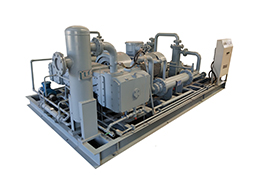Sales Department: 0552-3825188 0552-3825333
Accessories Department: 15955260712
Company Fax: 0552-3825255, 3825200
CNG Department: 13865028777 13865066118
After-sales service: 0552-3825155 0552-3825156
Company Address: No. 2581, Shuangdun Road, Huaishang District, Bengbu, Anhui Province
Company email: zdysj@126.com ahzdysj@126.com
The principle of compressor
A compressor is a machine that compresses gas and increases its pressure at the same time. It is widely used, and its common application areas include: HVAC, refrigeration cycle, supply of industrial drive power, silicon chemical industry, petrochemical industry, natural gas transportation, etc. According to its operating principle, it can be divided into volumetric compressor and gas-powered compressor.
The working principle of the compressor is to use the connecting rod to push the piston to move repeatedly to pressurize the gas for external transmission. It refers to the gas formed by the low-temperature liquid, such as LNG (-162 degrees Celsius), low-temperature propane (-40--42 degrees Celsius), low-temperature alkane (0--2 degrees Celsius), etc., which absorbs external heat in the storage tank and evaporates. With the increase of evaporating gas in the storage tank, the pressure in the storage tank continues to rise. In order to keep the pressure of the storage tank within the allowed range, it is generally necessary to compress BOG and then condense it into liquid or compress it before output. The compressor is a compressor used for compression.
Generally, the compressor uses oil-free lubrication reciprocating compressor, and the working principle is the same as that of ordinary reciprocating compressor. The difference is that the compressor inlet inhales low-temperature gas, so the first-stage cylinder, piston, etc. of the compressor must be resistant to low temperatures and avoid freezing. Oil-free lubrication is generally achieved by labyrinth seals or special piston rings.
Operating procedures
1. Prepare before starting and ensure that the unit pipelines are replaced with nitrogen;
Keep the lubricating oil level in the fuselage fuel tank within the specified range;
Turn the turning wheel 2-3 times to check for any obstruction or collision.
Open the water inlet and return valves of each cooler and adjust the water pressure to the specified range without leakage;
Check whether the pulley cover is firm and remove nearby objects;
Close the air inlet valve and open the air vent valve.
2. Driving
Tell the electrician to supply power, tell the central control room to start the motor, and put the compressor into no-load operation.
Make sure the oil pressure is within normal range.
Open the air inlet valve and slowly close the vent valve.
When the pressure reaches the network pressure, fully open the air supply valve and close the vent valve.
3.Maintenance during operation
Always keep the fuel level in the fuselage fuel tank within the specified range;
Check the pressure gauge readings and overall temperature at any time to see if they are within the specified range, and pay attention to whether the machine sounds are normal;
Check that there is no leakage in the oil circuit and no leakage in the piston rod seal;

Related News
- How to adjust the air volume of the air compressor?
- The status quo and development trend of compressor technology
- Knowledge about daily maintenance of air compressors
- Reasons for lack of compressor displacement
- What are the common faults of compressors?
- Maintenance of natural gas compressor
- Safe use of vinyl chloride compressors
- Analysis of several common failures of dimethyl ether compressor
- The structure and characteristics of vinyl chloride compressor
- How to maintain the vinyl chloride compressor?
- Fire extinguishing system for air compressor
- Application range of air compressor
- The use of oxygen compressor
- Working principle of biogas compressor
- Use of air compressor
- Introduction of Nitrogen Compressor
- Reasons why the air compressor pressure is not enough
- Working principle of hydrogen compressor
- Technological innovation and application prospects of oxygen compressors
- What is the working principle of carbon monoxide compressor?



